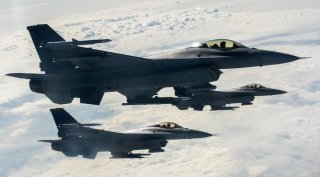Russia's War in Ukraine Demands U.S. Self-Reflection
The pursuit of primacy has pushed the United States to pursue maximalist objectives. That grand strategy has exacerbated conflicts and harmed U.S. interests with almost no debate about its efficacy.
Vladimir Putin’s actions in Ukraine are inexcusable, but the logic behind his decision can no longer be ignored or swept away as the justifications of a man determined to rebuild the Soviet Union. U.S. leadership must acknowledge the role their pursuit of primacy and negligence played in the current crisis. U.S.-backed NATO expansion to Russia’s borders following the Cold War was a mistake and unnecessarily inflammatory. The United States used NATO as a tool to advance its primacist agenda and cement its status as the lone superpower. Then, rather than acknowledge Russia’s legitimate and vocalized security concern regarding NATO expansion, by conceding that Ukraine would never gain admission to the security organization, the West made Ukraine suffer an invasion to achieve the same end.
The Biden administration seems ready to respond in primacist fashion announcing sanctions in quick order and vowing that Russia will bear the consequences. However, with sanctions also serving as a standard U.S. tool, their effectiveness is significantly diminished. The tactic has become overused and rarely reevaluated. This chronic application leaves their intentions questionable as the nation subject to sanctions has little reason to believe that any modified behavior will result in sanctions removal. This belief is more likely to produce a resistance attitude and steps to insulate their economy from sanctions than change behavior.
Iran is the prime example of the resistance approach. Despite Iran’s certified compliance with the Joint Comprehensive Plan of Action (JCPOA), the United States still backed out of the deal and renewed sanctions previously lifted under the agreement. This decision left Iran with the rationalized belief that the United States is anti-Iran and that the only option was maximum resistance in response to “maximum pressure.” To date, the JCPOA remains unrevived. Furthermore, the United States and Iran still haven’t met directly; instead, continuing to rely on shuttle diplomacy. The primacist approach dictates that the United States prevents Iran from obtaining a nuclear weapon while conceding little to nothing in return and maintaining its dominance in the region. However, this zero-sum attitude hasn’t produced any results. The situation only grows more complicated as Russia and Iran strengthen their working relationship. U.S. sanctions on Russia could inspire Putin to use his influence on the UN National Security Council to delay any JCPOA renewal.
The Russian invasion and flailing JCPOA aren’t the only issues to factor into the grand strategy debate. The Biden administration recently made two significant announcements: first announcing the decision to seize $3.5B in frozen Afghan assets to settle legal claims of families of 9/11 victims, and second, declaring Qatar a major non-NATO ally.
The administration’s decision to seize money from Afghanistan is another misguided use of American power to achieve maximalist outcomes motivated by the commitment to primacy. Afghanistan’s economic situation is already dire. Saddling the struggling nation with monetary penalties will only worsen its situation. Over 240,000 people have died in the Afghanistan and Pakistan war zones since 2001. More than 70,000 of those people were civilians. Afghanistan has paid more than enough through human loss. Seizing $3.5B from a desperate, war-torn country is beyond irresponsible and is the epitome of primacist rationale.
The decision to recognize Qatar as a Major non-NATO Ally is not necessarily a primacy-driven decision on its own. However, Biden must view the relationship through the lens of restraint, or it could quickly spiral into one. Qatar already ranks twentieth on the U.S. weapons recipient list. Additionally, Qatar is home to the U.S. Central Command’s forward Headquarters. It also has over $26B in active government-to-government cases under the Foreign Military Sales system, ranking second in the world. However, Qatar also served a critical diplomatic role in negotiating the U.S. withdrawal from Afghanistan and has remained active in bridging the gap between Tehran and Washington. Qatar’s true value in the Middle East is its ability to maintain relationships with allies and adversaries of the United States. Qatar’s “Major non-NATO Ally” designation should be used to build strong economic ties and promote the nation as a diplomatic power not further entrench the United States in a region that has decreasing value to U.S. interests.
These are very different issues and not all-inclusive as contention surrounding the Arctic and Taiwan will likely arise in the future as well. Primacy has pushed the United States to pursue maximalist objectives. That grand strategy has exacerbated conflicts and harmed U.S. interests with almost no debate about its efficacy. However, the Biden administration has the opportunity to look across the geopolitical landscape, reevaluate U.S. grand strategy, and make a consistent and complementary set of decisions that collectively align. The Biden administration must recognize it is time to advance a strategy focused on realism and restraint, not primacy.
Scott McCann is a Junior Foreign Policy Fellow at the Center for the National Interest. He holds a B.A. in Political Science from Louisiana State University and an M.A. in International Studies with concentrations in international security, intelligence, and conflict resolution from the Josef Korbel School of International Studies at the University of Denver.
Image: Flickr.

